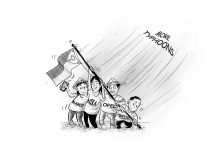BY JESS DUREZA
I SAT over a few bottles of San Mig Lite a few nights ago with a friend who just arrived from abroad.
He asked several pointed questions about the ongoing peace talks with the Moro Islamic Liberation Front (MILF).
Why can’t the military just wipe them out?
Why compromise or give in to the demands of armed rebels when they should instead be made to answer for rebellion, taking up arms and violating the laws?
Why are they allowed to establish camps that defy the government?
Why are they getting concessions more than those given to others who generally remain peaceful and law abiding?
Does this mean that others will have to first take up arms before they get equitable attention and benefits?
Why engage in peace talks with them in the first place?
Interesting and thought-provoking questions indeed.
ERAP’S WAR POLICY
I answered him by anecdotal recollection.
President Joseph “Erap” Estrada, during his incumbency, declared an all-out war against the MILF. The military attacked and overran rebel camps in 2000.
In fact, President Erap’s popularity rating reportedly went up due to his iron-fist policy against the Mindanao rebels.
Indeed, the main MILF camp, the famous Camp Abubakar, fell into the Armed Forces’ control. Many rebels were killed; their commanders were on the run.
But when the smoke of war cleared, the MILF was still around. Although badly bruised, it still remained intact.
The rebels just moved to other camps and re-grouped their forces.
They still retained the support of their Bangsamoro constituencies.
Their rebellion continues to this day, although prospects of a negotiated peace and the ceasefire have momentarily quieted the guns of war.
COST OF WAR
The question that always begs an answer is this: What is the cost of war? And is it worth it?
I explained to my friend that the “cost” referred to here is not only in terms of the peso cost of the conflict (bullets, bombs, armaments, logistics, etc.) but the more unquantifiable, real SOCIAL COST on civilians whose lives are destroyed, disrupted and damaged due to conflict and fighting.
The answer to this question surprised my friend. Unknown to him, about one million (yes, 1,000,000) Mindanaoans were directly affected by the Estrada war policy. Thousands of families were displaced and their normal lives disrupted, including the actual loss of lives of soldiers and rebels, and civilians caught in the crossfire.
This is not to mention the irreparable damage to the island region, now still being perceived as a war zone and a troubled land to the outside world.
The damage of the Estrada war policy was so extensive and deep that during my whole nine years in Malacañang in the Arroyo administration that followed, the healing of the wounds of war and the normalization of lives and the return and rehabilitation of those displaced continued to be a high priority task of the Mindanao agency I headed.
Again, during the Arroyo administration, the Armed Forces went on an offensive and dislodged MILF guru Hashim Salamat and his forces from his hideaway in Buliok, Pikit in the periphery of the Liguasan Marsh. The MILF again suffered heavy casualties and dispersed in various directions. But the civilian population suffered the most.
When I left government in 2010 or about 10 years after the first offensive, it was an unfinished task; the work to help those who suffered the so-called collateral damage of war was not yet fully done.
Up to this day, we still ask questions. Did the war policy quell the rebellion? Despite its obvious superiority did the government win the war?
Was the social cost of war worth the outcome? Is the military solution the answer?
Yes, we need the Armed Forces to periodically remind the rebels that they cannot continuously operate with impunity. In fact, such military offensives are also “incentives” for the rebels to stay the course in the peace process. It also serves as a stern warning that walking away from the negotiating table could bring peril to them and to their cause. But can this bring lasting peace? We know the answer./PN



